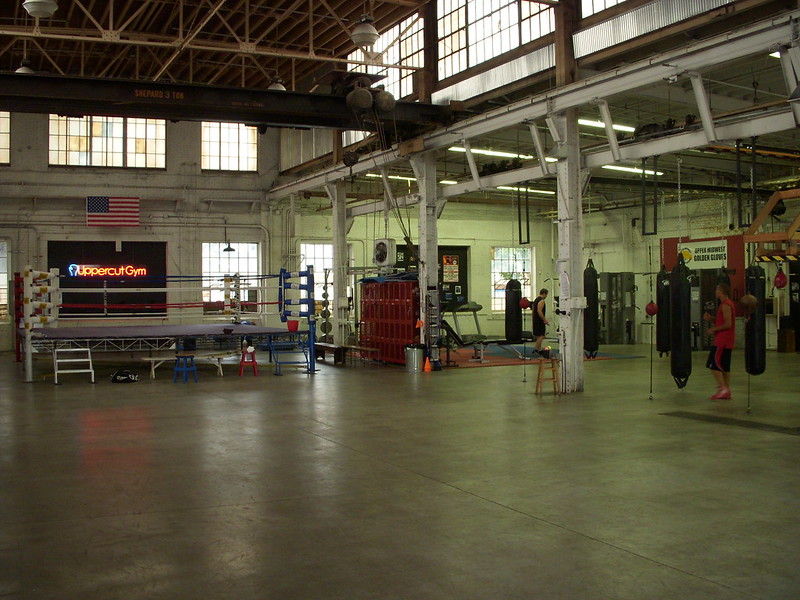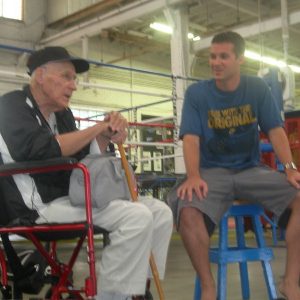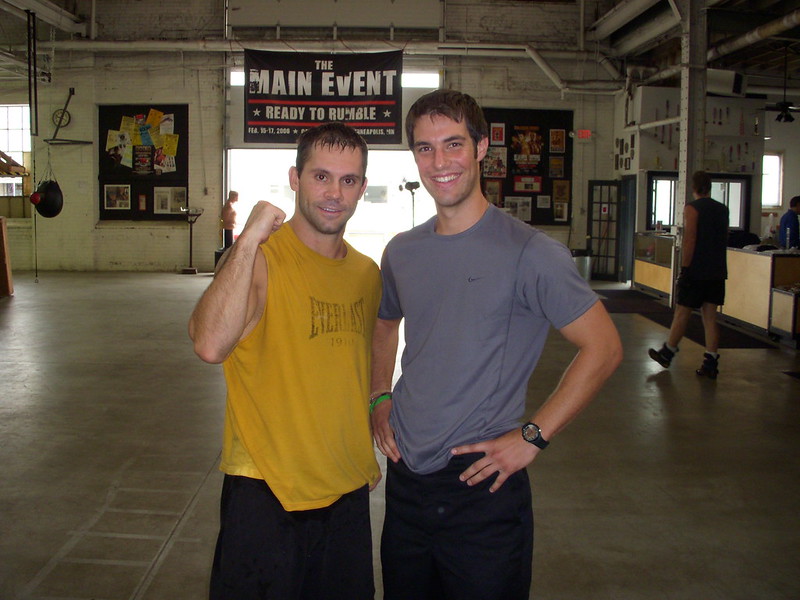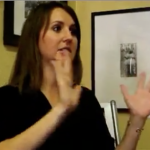
Interview: How To Become a Boxing Trainer
My name is Bill Kaehn. I’m from Minneapolis. Moved around the country quite a bit. I was very fortunate, if you want to call it fortunate, but I was born into the fight game. My father was a professional boxer and a boxing trainer. So I kind of followed in his footsteps.
I boxed as an amateur when I was younger. He never wanted me to box. He wanted me to get an education that he wasn’t able to get. He always stressed the education.
I went in the service in 1942. That put a stop to my boxing career. I was in Europe for most of the time. France and Germany. Chased the Germans all the way to Czechoslovakia towards the end of the war.
After the war, I boxed on the team over there. The United States Amateur Boxing Team. I came back with every intention of turning into a professional boxer. My dad sat me down one day.
In the interim, when I was gone in the service, he had developed two boxers that were outstanding. They became the best boxers ever turned out of the state of Minnesota. One was the young crown world’s lightweight champion. The other one was the next thing to it. They were brothers.
He wanted me to train them and not box myself like every parent usually wants their kid to do. Not get in the fight game. So he said, ‘As long as the government is paying for your education that earned through the service, why don’t you get the education at the University, and instead of boxing yourself, if you want to train boxers on the side, and more or less as a hobby.’
I didn’t like the idea. I was young and excitable. I wanted to box and I wanted everything that went with professional boxing. But, I thought I’d give it a try.
I went to school and when I started at the University of Minnesota, I made up my mind that I liked it. I thought I was going to try and get my degree in three years, which I did. I finished off a four year course in three years. In the meantime, on the side, I was training these two fighters my dad had worked with when I was in the service.
They both turned professional. One went on to be called the Great Lightweight Crowned Champion of the World. So I could see that was a better career for me. I didn’t have to get hit like these other guys who were taking all the punches. I liked it. And I was still involved in the fight game and at the same time I could get my degree at the U.
So that’s how I really got into the sport. I’ve been in it for…gosh, when I came back from the service, it was 1946. Before I went in I started boxing amateur myself was 1941. So I’ve been in it that many years. Off and on. Long time.
Wow. Sixty-six years of boxing? I guess it’s safe to say that boxing is your love and your passion?
Ohhh I love it! I’ve been fortunate because when the legs went out on me, it still enabled me to do what I liked. I can still come down to the gym every day and work with good boxers. I get everything that goes with the boxing. I can travel. I’ve got a wife of 59 years that has supported me all the while. So I’ve been pretty lucky.
So I guess you are pretty lucky to have found something that most people normally don’t get into. This isn’t a job you find in the classified ads. How do you think other people find their passion and their place in a job?
Oh gosh. There’s so many different ways of finding what you like in life. I always think this way: ‘You have to love what you’re doing.’ If you do that, you can go through life a lot easier than getting into something where you’re unhappy and you don’t like what you’re doing. There’s nothing worse than going to a daily grind where you don’t enjoy life and everything that goes with it.
I love this. Anthony picks me up. I still drive a little bit, believe it or not. But I ride with Anthony. He wheels me in here, brings me back to the car. That’s it. Great life.

So in the 66 years in boxing you’ve spent, you’ve seen a lot of boxers come and go. What’s really separated the good from the great?
A lot of dedication and hard work. I’ve been fortunate. I’ve had some good talent to work with. One world champion. I’ve had four boxers box for professional world titles. I’ve had two national amateur champions. I’ve had two world kick boxing champions. And a lot of good fighters in between. So I’ve had a pretty successful career.
And it’s just that dedication and hard work? Or is it passion or anything like that?
Yeah. It’s a hard sport because you have someone who wants to tear your face off when you climb through those ropes. It’s an awful tough sport. To stay in it, and continue at it, it takes a lot of perseverance. A lot of dedication.
So would you do anything differently?
Yeah, I would do something differently. As you get older, you become more domesticated and more of a family man. I regret some of the time I didn’t spend with my kids. I gave it to the sport. And I asked them, even now, my oldest son is 57. I ask him if I neglected him, and he says no. He says I never neglected him, and none of the kids felt that way. I’ve got two boys and a girl. They don’t have any regrets for what I did, but I do. In the back of my mind, I think I could have spent maybe more time with my kids that I gave to the sport here.
It makes me wonder sometimes.
It’s just a general conflict sometimes. Is there any way to give as much to the sport and still get that? Or do you have to make those compromises?
You have to make the compromises. Which I tried to do as much as possible. But at the same time, I sacrificed some of it because I was told a couple years of ago that this wasn’t a good place to develop boxers. You don’t get the good sparring partners. You don’t have the competition that you have in other parts of the country, like Las Vegas and New York. Those are boxing hotbeds. So if you want to become very successful from a monetary standpoint, the good trainers go to Las Vegas and New York.
I was told maybe thirty, forty years ago that if I wanted to make a lot of money in this sport, go to New York. I could have been introduced to people and wound up an instant millionaire, practically, for the experience I’ve had in boxing.
I talked to the family. My wife is from here. She’s a twin. My kids liked it here. That time I made the right decision. I thought life was more than the money and my family is more important than sacrificing what they want to do. If they’re willing to stay with me, then I’ll do what I’m doing and that’s it. That’s the decision I made.
Is there a motto that you have? That you teach by or live by?
Yeah. You know it’s funny. During the service, a lot of guys, they call them fox hole conversions. Mine was the opposite. I gravitated away from my religion and I picked it up after. I have a strong belief in my religion. I try to follow the dictates of my religion as much as possible. So I want to be decent to people and that’s about it.
Is there any advice you’d give to the three of us if we were to put on gloves?
Get an education (Laughs).
I want to know what you think of mixed martial arts.
Being a boxing purist, I can’t buy it. The criticism of boxing of the years has been the brutality end of it. I coached at the University of Minnesota for seventeen years. I had an objection every year from the female administrators. They said boxing was too brutal. They didn’t want to put it on the collegiate level. But we had very few injuries. As an amateur sport, the injuries are minimal. We would get very few injuries. Once in awhile a broken hand or broken nose that kind of goes with a sport like this, but compared to some of the other sports, the injuries were far and few between.
So talking to you right now, you seem like a really sweet guy. I mean, you’re a fair natured guy! Is that hard in a sport that is as hard as it is? Can you turn that on and off?
Oh yeah. You have to. It’s a tough business. You’ve got to adapt to the different situations that if it calls for you to be rough, you have to be rough. That’s what the sport calls for.
But I get a lot of the same…when we go out to a party or something, a lot of people don’t understand the fight game and they don’t understand how I could spend all these years in a sport like boxing. Because they don’t understand the sport, and they think it’s brutal.
Now compared to some of the things going on in ultimate fighting, they’re starting to realize boxing wasn’t so bad.
So what’s the most understood part about the fight game that people just don’t get?
Oh, I think it’s what it requires to develop the skills that are necessary to get to the top. There are so few that get all the way to the top. In many other sports, football you’ve got 11 guys, baseball you got nine. They’re team sports. But boxing is one guy. When that bell rings you crawl up those steps. There’s nobody there except for you and God Almighty. And the guy in front of you that is going to take your head off if he can do it. That’s about it.
God Almighty. That’s a good quote. What do you think about the current state of boxing? The heavyweight division has fallen off a little. Do you think the other divisions will resurrect the game? Or do you think it’s a fad with ups and downs?
I think it’s just the opposite. I think everything goes by the heavyweight division. If you have a good heavyweight champion, the rest of game follows in line. It creates an interest in boxing and develops more of a betterment of the sport. Right now, we don’t have a real popular, good heavyweight champion. So I think as the guys come along with good careers ahead of them- Muhammed Ali- then the sport picks up.
You’ve been around this for awhile. Have you seen a difference in generationally with the kids that come through? The attitudes? Good or bad?
Yeah. I don’t know if you could call it good or bad. It goes with the times. Times are different now than they were forty years ago. You have to adapt to the times too. As a trainer, you have to look at these kids that come in now and I treat them a little bit differently than the kids I worked with forty years ago.
Who was the world champion that you trained?
Tony! This kid here. Before he went on the Contender show he won a world title. You want to meet him?
I would love to meet him. My brother will lose it when I tell him.
Tony! Tony! Before you leave, check your weight. Then come on over here.
Which do you think is more applicable to everyday life. The things you learned from boxing, or the things you learned from school?
It’s a combination. It’s pretty hard to make a separation there. I think you learn different things. You learn so much about people in boxing. You work with so many people and there’s all different aspects. The kid that was just in here, he boxed for me back in the 1970’s. Now he’s a multimillionaire. He owns a huge company here in town. It’s nice to see someone like that come up.
Tony! These guys want to meet you. I don’t know why.
So you’re fighting this Friday?
Anthony ‘The Bullet’ Bosante: That’s what I’m doin’. Yep. This Friday. Goin’ to bust somebody up.







